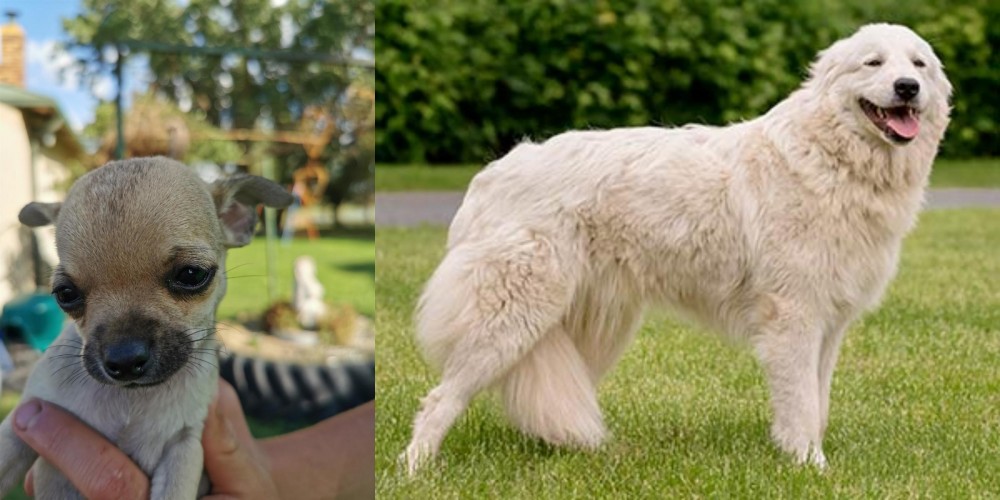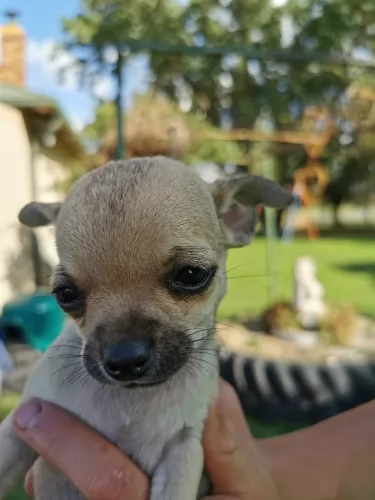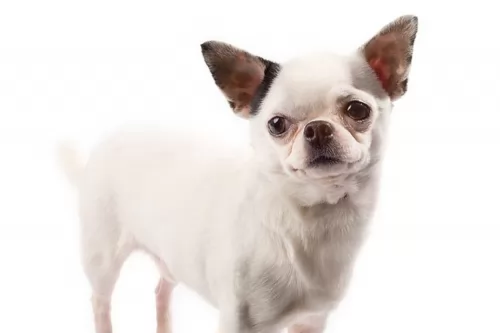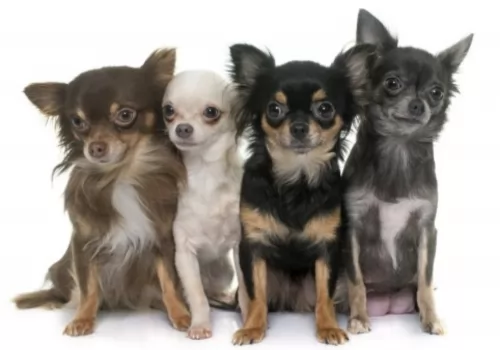 Petzlover
Petzlover Chihuahua is originated from Mexico but Maremma Sheepdog is originated from Italy. Chihuahua may grow 50 cm / 19 inches shorter than Maremma Sheepdog. Chihuahua may weigh 41 kg / 90 pounds lesser than Maremma Sheepdog. Chihuahua may live 7 years more than Maremma Sheepdog. Chihuahua may have less litter size than Maremma Sheepdog. Chihuahua requires Low Maintenance. But Maremma Sheepdog requires Moderate Maintenance
Chihuahua is originated from Mexico but Maremma Sheepdog is originated from Italy. Chihuahua may grow 50 cm / 19 inches shorter than Maremma Sheepdog. Chihuahua may weigh 41 kg / 90 pounds lesser than Maremma Sheepdog. Chihuahua may live 7 years more than Maremma Sheepdog. Chihuahua may have less litter size than Maremma Sheepdog. Chihuahua requires Low Maintenance. But Maremma Sheepdog requires Moderate Maintenance
 Quite a bit of the Chihuahua’s history is shrouded in mystery, and there are different versions about its origins.
Quite a bit of the Chihuahua’s history is shrouded in mystery, and there are different versions about its origins.
While historians speculate, most will agree that the tiny dog hails from Mexico. The UK Kennel Club considers the smooth- and long coat Chihuahuas as 2 distinct breeds.It was in 1904 that the Chihuahua became a registered breed by the American Kennel Club.
Chihuahua is actually the name of a state in Mexico, and it is amazing that Chihuahua specimens were found way back in the 1800's already. Today the Chihuahua is a very popular dog breed in several countries.
 Known also as the Cane de Pastore Maremmano-Abruzzese, the Maremma Sheepdog is often referred to as the Maremmano or the Abruzzese Sheepdog.
Known also as the Cane de Pastore Maremmano-Abruzzese, the Maremma Sheepdog is often referred to as the Maremmano or the Abruzzese Sheepdog.
This is a working dog – a guardian of sheep and an indigenous dog to central Italy. The dog has been used for centuries already to guard sheep.
It was in 1924 that the first standard for the breed was published.
 The small Chihuahua stands at about 15 – 23 cm and he weighs about 1,5 – 4kg.
The small Chihuahua stands at about 15 – 23 cm and he weighs about 1,5 – 4kg.
You’ll notice that he shivers when he is excited or when he is cold or frightened. Some people buy him a jersey to don on cooler days. With this tiny toy dog, you get a short- and a long coated Chihuahua.
This is the smallest dog breed and his coat is available in a number of colors such as fawn, tan, white and black. It is the dog’s round apple-shaped head which is a distinctive feature. He has erect ears and huge fruit-bat type eyes.
The Chihuahua is such an alert, fun-loving, feisty little dog, and though he may appear to be an ideal pet for children, he actually isn’t. He is too dainty and frail, and a child, during play, could accidentally crush him.
It’s a pity though because he just loves being around his human family. He is also a highly strung dog, and given the chance, he’ll nip and even bite during games. It is why socialization and training are considered important for the Chihuahua.
Just like with children, how you raise and treat your Chihuahua will determine how he turns out. He is such a sweet little dog that training and socialization can remove these unwanted characteristics. He is very intelligent and responds well to training.
 The Maremma Sheepdog is a large dog with a muscular build. Some people who have owned these distinctive-looking dogs say he is like a big bear. He stands at 65 to 73 cm in height, both male and female, and he weighs 35 to 45 kg.
The Maremma Sheepdog is a large dog with a muscular build. Some people who have owned these distinctive-looking dogs say he is like a big bear. He stands at 65 to 73 cm in height, both male and female, and he weighs 35 to 45 kg.
The coat is long, thick and white with a dense undercoat. If you look you’ll see flashes of pale orange or apricot amid the white. There is thicker, longer hair around the neck area.
The nose is black, the eyes brown and the ears medium length and floppy. The long tail is set low and is thickly feathered. You can expect 6 – 10 puppies from these dogs.
The Maremma has always been used to guarding sheep, and today even though he is looked upon as a wonderful, friendly companion dog, he also makes an excellent watch dog, being brave and courageous. He isn’t the kind of dog that you think of as getting wildly excited over something, as he has a dignified aura about him.
He is an independent dog, so training and sociaization will be absolutely imperative as he is strong-willed and likes to do things his way. Once trained and socialized, it is amazing to see such a large dog obeying all your commands such as ‘lie down, come, sit an stay'. He is very intelligent and shouldn’t have any trouble learning these basic commands.
He is calm and gets on well with children as well as other pets in the home. With his role as guardian of sheep, he has learned to be loyal and patient and will make a loyal ad loving family pet he takes his role as guardian very seriously.
He loves hard work, and shepherds have always appreciated the splendid work he does guarding their flocks. As a companion you will also appreciate the many excellent qualities he possesses.
The Maremma Sheepdog isn’t recommended for life in the city where there is a tiny garden. He has always been accustomed to large open spaces and requires a large garden. He won’t tolerate heat well with that thick coat of his and will require a shady spot in your garden to retreat to.
 Small and feisty, the Chihuahua’s personality isn’t set in stone, and the tiny dog can be either shy and timid or he can be social, confident and jaunty.
Small and feisty, the Chihuahua’s personality isn’t set in stone, and the tiny dog can be either shy and timid or he can be social, confident and jaunty.
They're always loyal and affectionate to their human owners, but they don’t get on too well with- and are wary of small children who aren’t disciplined and who could hurt them.
With his big eyes and big ears together with his comical antics, they can be a source of entertainment for their human owners. He is easy to train too and even though he is small, he doesn’t think he is, and he is willing to use his big personality to make you a loving, loyal and devoted companion.
 This is a beautiful dog, but large, so don’t make the mistake of wanting a large dog like this for his looks. He will be expensive to feed.
This is a beautiful dog, but large, so don’t make the mistake of wanting a large dog like this for his looks. He will be expensive to feed.
If you have the means to provide a good home for him, he is friendly and good natured, even though he is strong-willed and independent.
Provide him with a good home and you’ll have a most splendid pet and companion.
 The Chihuahua doesn't have any particular health issues, more so when you get him from a reputable breeder. With good care he can reach 20 years of age.
The Chihuahua doesn't have any particular health issues, more so when you get him from a reputable breeder. With good care he can reach 20 years of age.
Known as low blood sugar, hypoglycemia is easily treatable, but if it isn’t caught early it can be fatal.Hypoglycemia makes a dog lethargic and he’ll shiver and could go into a coma. Get him to the vet immediately.
Gastric Dilatation or bloat is when the stomach twists, it becomes enlarged and blood supply is cut off to the stomach. Left untreated, it can be fatal.
Chihuahuas are susceptible to dental problems, so you will need to brush his teeth 2 or 3 times a week to prevent tartar build-up, gum disease, loss of teeth and other diseases.
 This ancient dog breed is robust and can reach 11 to 13 years of age when cared for properly. Like any other dogs, he can be prone to certain health problems.
This ancient dog breed is robust and can reach 11 to 13 years of age when cared for properly. Like any other dogs, he can be prone to certain health problems.
One of these is hip dysplasia. Preventing your dog from becoming overweight can work towards preventing these kinds of musculoskeletal issues. Hip dysplasia occurs when your dog’s hip joints don’t develop properly so that the hips partially dislocate.
It is painful for your dog and it can be debilitating, leading to arthritis too and making it difficult for your pet to get around and to get up from lying down. There are a number of treatment options offered by your vet.
 Always make sure to choose a high-quality dog food for your Chihuahua as this will keep him in tip-top health. A healthy Chihuahua can live to be 20 years of age. Speak to a veterinarian for recommendations on the best type of food to feed your tiny pet.
Always make sure to choose a high-quality dog food for your Chihuahua as this will keep him in tip-top health. A healthy Chihuahua can live to be 20 years of age. Speak to a veterinarian for recommendations on the best type of food to feed your tiny pet.
Giving him some home-made food such as brown rice, vegetables and cooked chicken for instance will be a welcome treat for him. Make sure he always has a bowl of fresh, cool water close by.
The Chihuahua may well be the smallest toy sized dog breed, but don’t be mistaken – he has plenty of energy and is constantly prancing around. He is more than capable of living in a small apartment, but even so he needs to be taken outside every now and then for a game or a walk.
Be careful with your small pet though, as too much exercise can lead to elbow- and hip dysplasia.
The Chihuahua is a moderate shedder with Spring being their heavier shedding period. Because of his small size, you won’t be bothered by too much hair. The short haired Chihuahua is easy to maintain and with a rubber brush, you can brush him gently twice a week.
You’ll also need to clip his nails and if you can’t manage this your vet can also help you.
 As already suggested, this large dog will need space and he will need to be exercised. Apart from long walks in he countryside or in the park or your neighborhood, he will also need other activities that stimulate him mentally and physically.
As already suggested, this large dog will need space and he will need to be exercised. Apart from long walks in he countryside or in the park or your neighborhood, he will also need other activities that stimulate him mentally and physically.
The thick, all-weather coat of the Maremma will need a thorough bushing at least twice a week to get rid of all those loose hairs. When you are brushing him, look around for signs of ticks and fleas too and run your hands over him to feel for any unusual lumps.
The Maremma is a large-breed dog, so before you get a big dog like this, decide whether you have the financial means to feed him and look after him properly. He is going to cost a lot to feed, so think it through first.
He will need to be fed a high-quality commercial dog food which has been specially formulated for a dog of his size. Keep the food of dogs simple. We’re all tempted to feed our dog treats like things such as chocolates, coffee, nuts, onions, grapes and raisins but these can cause havoc with your dog’s stomach.
Stick to simple, nutritious food. Boiled chicken, brown rice or pasta and vegetables such as potatoes, spinach and carrots can do wonders for your pet when you sometimes mix this into his kibble.
Try and mix some raw meat into his diet occasionally. Make sure he always has access to fresh, cool water.